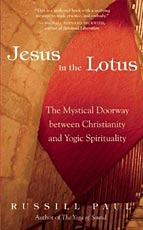". . . you cannot make the Divine love you: you cannot force the relationship as an act of will. You may use your will to choose to pursue the relationship, but to actually know God, to consummate the relationship, you must surrender your will entirely and allow God to choose you. Father Keating explains: 'The work of the will in prayer is real work, but it is one of receiving. Receiving is one of the most difficult kinds of activity there is. To receive God is the chief work in contemplative prayer.'
"This is why I feel that the relationship we cultivate and then build with the Divine is very much like a marriage. Why marriage? Why not conversation or dialogue or partnership? Because only marriage, as a metaphor, carries all the meanings that must characterize an authentic relationship with the Divine. Marriage is a sacred partnership of equals, a special kind of relationship that involves intimacy as well as hard work, shared vision as well as the honoring of individuality, and mutual support as well as challenge. In the spiritual fire of marriage, we are challenged constantly to work through our shadow sides, dismantle our false selves, and progress toward wholeness and integrity, because our marriage partners mirror our gradual transformations and regressions, and we are engaged in this mirroring process all the time. Most important, we cannot take marriage for granted. We must be willing to work at continually nurturing it, or it simply falls apart. It is precisely for this reason that Christian monks, nuns, and priests consider themselves 'married to Christ.'
"Another important feature of marriage is that it is a relationship in which we retain our differences and our uniqueness while, at the same time, realizing that our partnership is greater than either individual. Marriage offers an engaged partnership and a sense of equality, which is the direction in which our religions must head. In marriage, however much we may dislike certain aspects of the other, we are committed to growth in love for this person. Love is always patient, kind, and forgiving. Yet love also challenges us to grow.
"In a marriage between human beings, one of the most important qualities is trust. Similarly, it takes trust to stay engaged in your relationship with the spiritual dimension of your being. Many spiritual seekers move from practice to practice, teacher to teacher, system to system, because the novelty of the approach quickly wears off. It takes trust to repeatedly turn within and passionately seek the Beloved in the depths of your being. The process mirrors human relationships. At first, you are excited about a person as you glimpse the radiance of his or her soul. Then, as you begin to engage in a relationship, the structures of the person's ego begin to show, just as your own ego structures do. It is trust that keeps you working through the difficulties that ensue.
"All relationships take work, and your relationship with the Divine is no different, except that the Divine has no ego. The Spirit is pure, undivided consciousness, and you have to discover that a part of you is spirit too, existing in the image and likeness of the Divine. One danger of the New Age movement, in its indiscriminate obsession for all kinds of spiritual experience, is the tendency to want to sleep with the Divine (meaning, to have intimacy with God) while avoiding the hard work of true relationship. Again, this mentality is not too far from what we see in the realm of human relationships.
"In a good human marriage, love infuses the partnership and becomes the underlying reason for everything the two partners do to build and deepen the relationship. Fidelity, trust, intimacy, and self-sacrifice must all flow from this love, not from fear, coercion, or even a sense of duty or responsibility. Doing good or being good out of fear of going to hell, for example, is a very limited expression of charity. To love for love's sake, on the other hand, is the most natural thing in the world. It is not self-seeking, does not have a why, and contains no hidden agenda. To learn to live and love without a why is the most liberating human experience."
